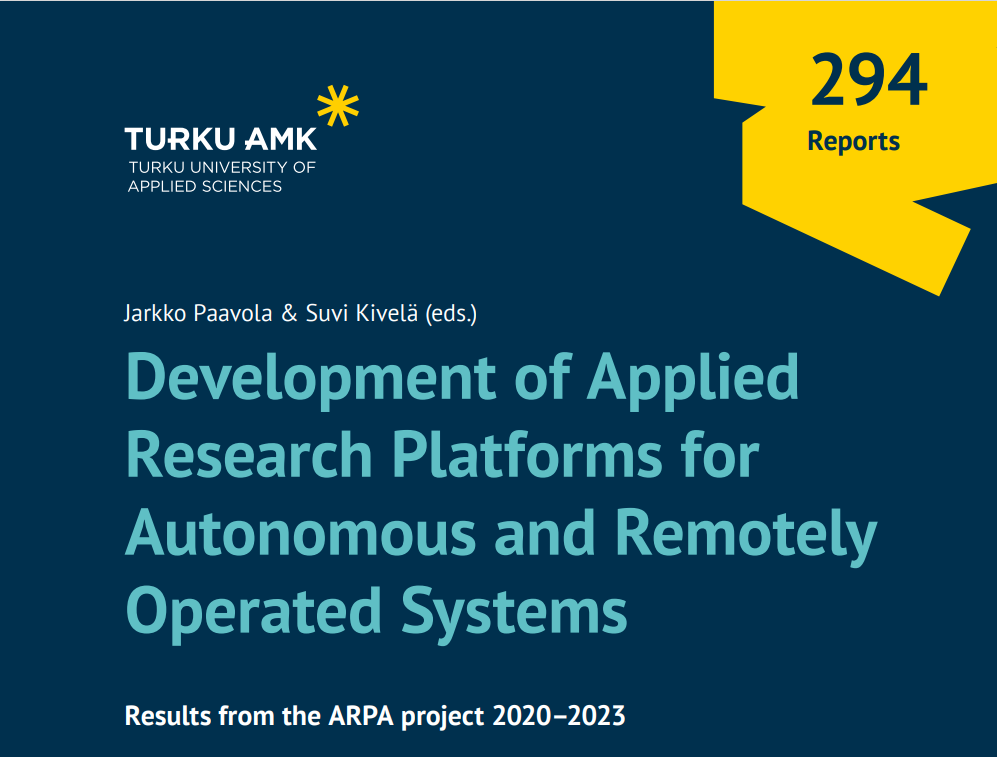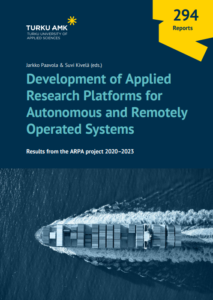Results from ARPA project have been published

Welcome to the final deliverable of the ARPA project, a collaborative effort between Turku University of Applied Sciences and Novia University of Applied Sciences from 2020 to 2023. ARPA acronym stands for Applied Research Platform for Autonomous Systems. Due to their importance for South-West Finland, we focused on the digitalization of marine industry and shipping.
Funded by the Ministry of Education and Culture with a two-million-euro grant for the period of 1.10.2020-31.12.2023, the ARPA project is part of the RDI profiling initiative. This initiative strategically positions both universities to focus on autonomous systems in the future.
The journey towards fully autonomous logistics involves significant steps such as remote operations and partly automated vessels. However, this journey is long and heavily dependent on the evolution of regulatory processes.
The ARPA project was structured around three focus areas: physical environments, virtual environments, and a Data Platform that bridges these domains.
Physical research platforms are a test vessel, a Remote Operation Center (ROC), and industrial environment. Metaverse, digital twins and simulations create meaningful digital prototyping and testing environments complementing physical RDI environments. The data platform is the central hub for all the data collected in physical test environments and produced within digital twins and simulations. The platform will be utilized in distributing open data sets.
Main results presented in ARPA final publication are the following:
- Development maritime RDI environments
- Test Vessel eM/S Salama is presented in article Test Vessel eM/S Salama, its sensoring platform for navigational situational awareness in the article Sensor Platform Design, and wireless connectivity to provide data transfer to Remote Operation Center (ROC) in the article Wireless connectivity for situational awareness and remote operations,
- Remote operation center for the eM/S Salama is presented in details in the article Remote Operations Center, and it is Metaverse applications in the article Next Generations ROC Solution – Visualizing Sensor Fusion to Enable Remote Control of an Electric Boat Inside the Metaverse,
- Novel use case for remote operation center Remote Pilotage concept is presented in the article A Virtual Reality Remote Pilotage Concept. Majority of communications in maritime domain is still speech in VHF frequencies. The digitalization concept for providing this information to ROC is investigated in the article A Concept of Maritime Automatic Speech Recognition.
- The Data Platform and related data governance is presented in the article Data Platform Design. A way forward towards true maritime digital twin is presented in article Towards a Roadmap of Maritime Digital Twins. Cybersecurity issues are considered in the article Cybersecurity threat information sharing for the maritime environment.
- In addition to maritime environment, ARPA project developed also robotics and automation test platforms for targeting Industry 4.0 applications in factory environment as presented in the article RDI environment for advanced robotics and autonomous work machines, and in the article Industrial Metaverse Approach – How to Remotely Control Robots in a Multiuser Environment for Metaverse approach.
The ARPA project has significantly impacted both participating universities of applied sciences. We now look forward to continuing our work with external stakeholders, including companies, authorities, universities, and research organizations. Our goal is to enable the development of reliable, safe, secure, and trustworthy remotely operated, automated, and autonomous systems.
You can read more from our final publication: Development of Applied Research Platform for Autonomous and Remotely Operated Systems. Results from the ARPA project 2020-2023.

Thank you for your interest in our project.
Jarkko Paavola, Project Manager, Turku University of Applied Sciences
